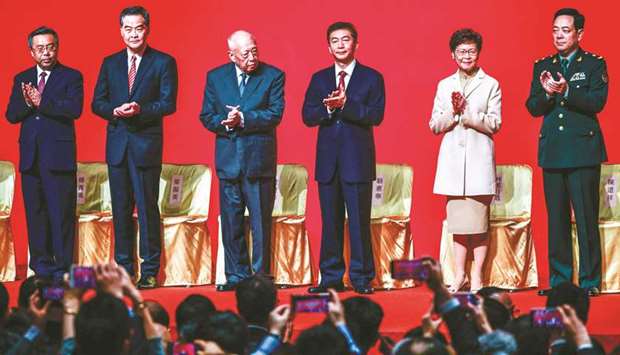Hong Kong’s annual firework display to usher in Chinese New Year will be cancelled due to ongoing public safety concerns following more than a half year of anti-government unrest, the region’s government announced yesterday.
The lunar new year display to welcome the Year of the Rat was to take place January 26, lighting up the skyscraper-filled backdrop of Victoria Harbour. The event traditionally draws in thousands of visitors and local onlookers.
This is the second time in weeks the Hong Kong Tourism Board (HKTB), which organises such events, has had to tone down popular event.
The city’s firework countdown to welcome 2020 was also cancelled – and replaced with a subdued light show – amid similar concerns. Normal life has ground to a halt multiple times in Hong Kong since last year, after protests began against legislation that would have allowed officials to extradite suspects to China for trial.
Although the legislation is no longer being considered, the anti-government demonstrations continue. Instead of the fireworks and accompanying parade, the HKTB is now planning a four-day carnival with performances, spread out over multiple days. Kenneth Wong, European regional director for HKTB, said his organisation expected to continue to see a challenging time for Hong Kong tourism in 2020.
“We hope that all participants follow the rules and regulations at the event venue and do not cause a nuisance or disturbance to others,” he said to DPA.
The former British colony had an estimated 56mn visitors in 2019, a 14-per-cent drop on the previous year.
Meanwhile, solutions to the political crisis seem to be nowhere in sight, as rifts and violence continue to deepen and escalate between anti-government protesters and Hong Kong police, who have been accused of using disproportionate force against protesters, a factor now driving the protests amid public support and outrage.
The first day of 2020 was marked by more than 1mn people who took to the streets in the first legal assembly of the year, showing widespread public support for the protests and anger at the government’s response.
Police shut the mass rally down after making a small number of arrests following a vandalism incident. They used tear gas to disperse the crowd and pepper sprayed some citizens who questioned what they were doing. With the prospect of an independent inquiry blocked by officials, violent stand-offs between police and protesters continue. This week saw four men arrested after a raid uncovered explosives and a pipe bomb, government-backed broadcaster RTHK reported. Police found what they called “protest-related materials” in a Tuesday evening raid at a flat in Mong Kok, a densely populated residential area known for its outdoor markets and shopping areas.
Police also searched a house in Sheung Shui, a town close to Hong Kong’s border with mainland China, which they suspect was being used a laboratory for producing explosives, according to RTHK.
The pipe bomb — said to contain around 40g of explosives — was detonated by bomb disposal experts, which caused some damage to the building.
Police say that the bomb could have caused significant casualties. On Sunday, Human Rights Watch director Kenneth Roth was refused entry into Hong Kong, where he planned to deliver an annual report on Hong Kong. Roth said in a statement that he hoped to spotlight Beijing’s deepening assault on international efforts to uphold human rights.
“The refusal to let me enter Hong Kong vividly illustrates the problem,” he said. A British Human rights campaigner, Luke de Pulford, who lobbies the government on the Human rights issues facing Hong Kong citizens and serves on the Conservative Party Human Rights Commission, says he doesn’t think protests will end until the core demands of the protesters are met.
“This will require concrete steps to be taken towards Beijing keeping its promises under the Basic Law regarding universal suffrage,” he said.
De Pulford said if there is more violent resistance, protesters will lose international support, but if the demonstrations wane, Lam’s government will feel it has less of a problem to solve. Hong Kong was promised special rights and privileges under the ‘One Country, Two Systems’ framework put in place when the British handed the region back to China in 1997, after 150 years of colonial rule.
International / ASEAN/Philippines
Chinese New Year fireworks in Hong Kong cancelled as crisis continues

Chief Executive of Hong Kong, Carrie Lam (second right), stands on stage with other dignitaries at the Spring Festival Reception in Hong Kong yesterday.
